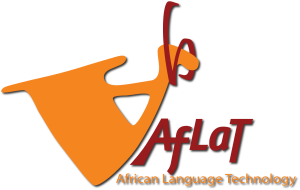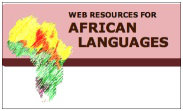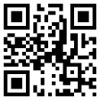AfLaT 2010 - FINAL CALL FOR PAPERS
SECOND WORKSHOP ON AFRICAN LANGUAGE TECHNOLOGY
AfLaT 2010
18 MAY 2010, VALLETTA, MALTA
Workshop at the seventh international conference on Language Resources and Evaluation (LREC) 2010
ABOUT THE WORKSHOP
In multilingual situations, language technologies are crucial for providing access to information and opportunities for economic development. With somewhere between 1,000 and 2,000 different languages, Africa is a multilingual continent par excellence and presents acute challenges for those seeking to promote and use African languages in the areas of business development, education, research, and relief aid. In recent times a number of African researchers and institutions have come forward that share the common goal of developing capabilities in language technologies. This workshop provides a forum to meet and share the latest developments in this field. It also seeks to include linguists who specialize in African languages and would like to leverage the tools and approaches of computational linguistics, as well as computational linguists who are interested in learning about the particular linguistic challenges posed by African languages.
The workshop will consist of an invited talk, followed by refereed research papers in computational linguistics. The focus will be on sub-Saharan African languages, excluding Arabic and languages with European origins, such as Afrikaans and African variants of English and French. We invite submissions on any topic related to language and speech technology and African languages including, but not limited to, the following:
- Corpora and corpus annotation
- Machine readable lexicons
- Morphological analyzers and spelling checkers
- Part of speech taggers and parsers
- Speech recognition and synthesis
- Applications such as machine translation, information extraction, information retrieval, computer-assisted language learning and question answering
- The role of language technologies in economic development, education, healthcare, and emergency and public services
- Documentation of endangered languages and the use of language technologies to enhance language vitality
- The combination of language and speech technology with mobile phone technology.
OBJECTIVES OF THE WORKSHOP
- Assess the state-of-the-art in the development of BLARKs for sub-Saharan African languages
- Address issues of efficient and sufficient collection and annotation of spoken and written language samples
- Define particular issues in machine translation, speech recognition, and other language technology applications
- Discuss community needs in education and vitality of language and culture, such as localization of operating systems and applications, spelling checkers, dictionaries, computer assisted language learning and the like
- Assess the role of language technology in bridging the digital divide, particularly in light of rapidly emerging technologies, such as mobile phones
- Strengthen the network of researchers working in the domain of African Language Technology
SUBMISSION INSTRUCTIONS
Authors are invited to submit original work in the topic area of this workshop. Submissions should be formatted using the LREC style sheet and should not exceed four (4) pages, including references.
The reviewing will be blind and the paper should therefore not include the authors' names and affiliations. Submission will be electronic. Papers must be submitted no later than 15 February, 2010 using the submission webpage: https://www.softconf.com/lrec2010/AfLaT2010.
When submitting a paper from the START page, authors will be asked to provide essential information about resources (in a broad sense, i.e. also technologies, standards, evaluation kits, etc.) that have been used for the work described in the paper or are a new result of your research. For further information on this new initiative, please refer to https://www.lrec-conf.org/lrec2010/?LREC2010-Map-of-Language-Resources.
Submissions will be reviewed by 3 members of the Program Committee. Authors of accepted papers will receive guidelines on how to produce camera-ready versions of their papers for inclusion in the LREC workshop proceedings. Notification of receipt will be emailed to the contact author.
IMPORTANT DATES
Submission deadline: 19 February, 2010 (extended!)
Notification of acceptance: 12 March, 2010
Camera-ready papers due: 22 March, 2010
Workshop: 18 May 2010
ORGANIZING COMMITTEE
- Guy De Pauw (Workshop Chair - Contact Person)
(1) CLiPS Research Group, University of Antwerp, Prinsstraat 13, 2000 Antwerpen, Belgium
(2) School of Computing and Informatics, University of Nairobi, PO Box 30197 - 00100GPO
Nairobi, Kenya
https://aflat.org/guy - Handré Groenewald
Centre for Text Technology (CTexT), North-West University (Potchefstroom Campus), Potchefstroom 2520, South Africa
https://www.nwu.ac.za/ctext - Gilles-Maurice de Schryver
(1) African Languages and Cultures, Ghent University, Rozier 44, 9000 Gent, Belgium
(2) Xhosa Department, University of the Western Cape, Bellville, Republic of South Africa
(3) TshwaneDJe HLT, Pretoria, Republic of South Africa
https://tshwanedje.com/members/gmds/cv.html - Peter Waiganjo Wagacha
School of Computing and Informatics, University of Nairobi, PO Box 30197 - 00100GPO Nairobi, Kenya
https://www.uonbi.ac.ke/faculties/staff-profile.php?id=168090&name=waiganjo&fac code=52
INVITED SPEAKER
Justus Roux: "Do we need linguistic knowledge for speech technology applications in African languages?"
PROGRAM COMMITTEE
Tunde Adegbola - African Languages Technlogy Initiative (Alt-i), Nigeria
Tadesse Anberbir - Addis Ababa University, Ethiopia
Winston Anderson - University of South Africa, South Africa
Lars Asker - Stockholm University, Sweden
Etienne Barnard - Meraka Institute, South Africa
Piotr Bański - University of Warsaw, Poland
Ansu Berg - North-West University, South Africa
Sonja Bosch - University of South Africa, South Africa
Chantal Enguehard - LINA - UMR CNRS, France
Gertrud Faaß - Universität Stuttgart, Germany
Bjorn Gamback - Swedish Institute of Computer Science, Sweden
Katherine Getao - NEPAD e-Africa Commission, South Africa
Dafydd Gibbon - Universität Bielefeld, Germany
Arvi Hurskainen - University of Helsinki, Finland
Fred Kitoogo - Makerere University, Uganda
Roser Morante - University of Antwerp, Belgium
Lawrence Muchemi - University of Nairobi, Kenya
Wanjiku Ng'ang'a - University of Nairobi, Kenya
Odetunji Odejobi - University College Cork, Ireland
Chinyere Ohiri-Anichie - University of Lagos, Nigeria
Sulene Pilon - North-West University, South Africa
Laurette Pretorius - University of South Africa, South Africa
Rigardt Pretorius - North-West University, South Africa
Danie Prinsloo - University of Pretoria, South Africa
Justus Roux - North-West University, South Africa
Kevin Scannell - Saint Louis University, United States
Gerhard Van Huyssteen - Meraka Institute, South Africa
- Login to post comments


